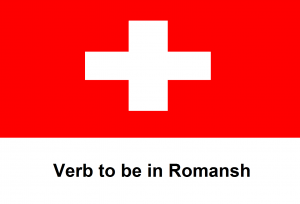Difference between revisions of "Language/Romansh/Grammar/How-to-Use-Be"
Jump to navigation
Jump to search
| (3 intermediate revisions by 2 users not shown) | |||
| Line 4: | Line 4: | ||
Hello Romansh language learners, | Hello Romansh language learners, | ||
In today's lesson you will learn how to use the verb "To Be" in Romansh | In today's lesson you will learn how to use the verb "To Be" in Romansh | ||
Feel free to edit this page by adding new words and expressions ! | Feel free to edit this page by adding new words and expressions ! | ||
Happy learning ! 😀 | Happy learning ! 😀 | ||
<span link>Finish this lesson and explore these related pages:</span> [[Language/Romansh/Grammar|Romansh Grammar]], [[Language/Romansh/Grammar/Past-Tense|Past Tense]], [[Language/Romansh/Grammar/Indefinite-Articles-in-Romansh|Indefinite Articles in Romansh]] & [[Language/Romansh/Grammar/Imperative-Mood|Imperative Mood]]. | |||
__TOC__ | __TOC__ | ||
==Verb : esser (Past tense)== | ==Verb : esser (Past tense)== | ||
| Line 47: | Line 44: | ||
|Eles eram | |Eles eram | ||
|} | |} | ||
==Verb : esser (Present tense)== | ==Verb : esser (Present tense)== | ||
| Line 80: | Line 76: | ||
|Eles são | |Eles são | ||
|} | |} | ||
==Verb : esser (Future tense)== | ==Verb : esser (Future tense)== | ||
| Line 113: | Line 108: | ||
|Eles vão ser | |Eles vão ser | ||
|} | |} | ||
==Verb : esser (Present tense / Negative form)== | ==Verb : esser (Present tense / Negative form)== | ||
* Use the word (NA) before the verb and the word (BETG) after the verb (it works for all tenses (Past / Present and Future) | |||
{| class="wikitable sortable" | {| class="wikitable sortable" | ||
|- | |- | ||
| Line 147: | Line 141: | ||
|Eles não são | |Eles não são | ||
|} | |} | ||
==Other Lessons== | |||
* [[Language/Romansh/Grammar/Indefinite-Articles-in-Romansh|Indefinite Articles in Romansh]] | |||
* [[Language/Romansh/Grammar/Prepositions|Prepositions]] | |||
* [[Language/Romansh/Grammar/Past-Tense|Past Tense]] | |||
* [[Language/Romansh/Grammar/Present-Tense|Present Tense]] | |||
* [[Language/Romansh/Grammar/Possessive-Case-in-Romansh|Possessive Case in Romansh]] | |||
* [[Language/Romansh/Grammar/Future-Tense|Future Tense]] | |||
* [[Language/Romansh/Grammar/Conditional-Tense|Conditional Tense]] | |||
* [[Language/Romansh/Grammar/Imperative-Mood|Imperative Mood]] | |||
* [[Language/Romansh/Grammar/How-to-Use-Have|How to Use Have]] | |||
<span links></span> | |||
Latest revision as of 14:41, 22 February 2024
How to Use the Verb "to Be" in Romansh
Hello Romansh language learners,
In today's lesson you will learn how to use the verb "To Be" in Romansh
Feel free to edit this page by adding new words and expressions !
Happy learning ! 😀
Finish this lesson and explore these related pages: Romansh Grammar, Past Tense, Indefinite Articles in Romansh & Imperative Mood.
Verb : esser (Past tense)[edit | edit source]
| ENGLISH | ROMANSH | PORTUGUESE |
|---|---|---|
| I was | Jau era | Eu era |
| You were | Ti eras | Você era |
| He was | El era | Ele era |
| We were | Nus eran | Nós éramos |
| You were | Vus eras | Vocês eram |
| They were (mas) | Els eran | Eles eram |
Verb : esser (Present tense)[edit | edit source]
| ENGLISH | ROMANSH | PORTUGUESE |
|---|---|---|
| I am | Jau sun | Eu sou |
| You are | Ti es | Você é |
| He is | El è | Ele é |
| We are | Nus essan | Nós somos |
| You are | Vus essas | Vocês são |
| They are (mas) | Els èn | Eles são |
Verb : esser (Future tense)[edit | edit source]
| ENGLISH | ROMANSH | PORTUGUESE |
|---|---|---|
| I will be | Jau vegn ad esser | Eu vou ser |
| You will be | Ti vegns ad esser | Você vai ser |
| He will be | El vegn ad esser | Ele vai ser |
| We will be | Nus vegnin ad esser | Nós vamos ser |
| You will be | Vus vegnis ad esser | Vocês vão ser |
| They will be (mas) | Els vegnan ad esser | Eles vão ser |
Verb : esser (Present tense / Negative form)[edit | edit source]
- Use the word (NA) before the verb and the word (BETG) after the verb (it works for all tenses (Past / Present and Future)
| ENGLISH | ROMANSH | PORTUGUESE |
|---|---|---|
| I am not | Jau na sun betg | Eu não sou |
| You are not | Ti n`es betg | Você não é |
| He is not | El n`è betg | Ele não é |
| We are not | Nus n`essan betg | Nós não somos |
| You are not | Vus n`essas betg | Vocês não são |
| They are not (mas) | Els n`èn betg | Eles não são |
Other Lessons[edit | edit source]
- Indefinite Articles in Romansh
- Prepositions
- Past Tense
- Present Tense
- Possessive Case in Romansh
- Future Tense
- Conditional Tense
- Imperative Mood
- How to Use Have
